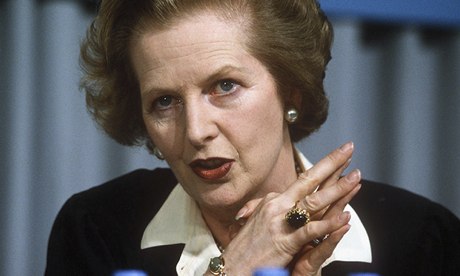The 'selling of the family silver' that began in earnest under Thatcher is still in train; sometimes I wonder if the entire political class should be put out to tender

Widespread privatisation was a key pledge in Margaret Thatcher’s 1983 election manifesto. Photograph: Chris Capstick/Rex Features
The phrase "selling the family silver" became the most celebrated if not the deepest criticism of Mrs Thatcher's privatisation programme, though Harold Macmillan never used those exact words. At a dinner of the Tory Reform Group – wets, moderates, Europhiles, none of them "one of us" – the former prime minister devised a more extended metaphor that drew on an aristocratic lifestyle that had been failing since its heyday in his Edwardian childhood. When individuals or estates ran into financial trouble, he said, they would commonly sell a few of their assets. "First the Georgian silver goes [laughter, applause]. Then all that nice furniture that used to be in the saloon. Then the Canalettos go [laughter, applause]."
He began to wander a bit. "And then the most tasty morsel, the most productive of all, they got rid of Cable and Wireless, and having got rid of the only part of the railways that paid, and a part of the steel industry that paid, and having sold this and that, the great thing of the monopoly telephone system came on the market. They [sic] were like the two Rembrandts that were still left [laughter] and they went, and now we're promised in the king's speech a further sale of anything that can be scraped up. You can't sell the coalmines, I'm afraid, because nobody will buy them [laughter, prolonged applause]."
When Macmillan made the speech, on 8 November 1985, he was 91 and had just over a year left to live. He still cut an attractive figure – the inverted V of his bow tie matched the weary droop of his moustache and eyebrows – though his reference to the king's speech suggested that a few marbles were coming unstuck in what was once one of the sharpest minds in British politics. The audience loved him. He was the last British prime minister to have served in the first world war, where he was badly wounded, and the last born during Victoria's reign; a "born actor", people said, because he was always so effortlessly droll. His references to oil paintings and precious tableware, his correct but vintage use of the word "saloon": this kind of thing endeared him to the public for much the same reasons as Downton Abbey did 25 years later – as an amusing and slightly camp version of a previous age.
He disavowed the speech only a few days afterwards, telling the House of Lords that he'd been misunderstood. All he was questioning was the government's wisdom in treating the capital raised by privatisation as income; as a Conservative he was "naturally in favour of returning into private ownership … all those means of production and distribution which are now controlled by state capitalism". But the metaphor had made its mark, and the fact is that Macmillan's "family silver" and British Gas's "Tell Sid" slogan are probably the most-remembered phrases from the early years of the war against public ownership. Oddly, given that privatisation was to have such profound effects on British life, both in their different ways raised a smile; did we know what was coming?
At the time of Macmillan's speech, privatisation had hardly begun. British Rail's ferries and hotels were the first to go (how strange it now seems that the best hotels in almost every city outside London were owned and run – usually well – by public servants in the most literal sense). But British Telecom, British Steel, British Airways, British Shipbuilders and Rolls-Royce – all of them listed as targets in the Tories' 1983 manifesto – had still to complete their journey from the public sector, and the big privatisations that that would affect every household had yet to come. Gas, water, electricity: people puzzled as to how the same stuff flowing through the same pipes and wires could be owned by different companies, and yet somehow it became so in the name of competition. Then came the British Airports Authority and British Rail and large chunks of the Ministry of Defence, while many public institutions such as local authorities and the NHS outsourced much of their activity and shrank sometimes to the role of regulator. Nigel Lawson triumphantly announced "the birth of people's capitalism", but many private companies sold out to foreign ownership; others were taken over by private equiteers; others again subsumed into octopus-like businesses such as Serco and G4S, which picked up the contracts for outsourced work ranging from Royal Navy tugboats to nursing assistants.
This landscape is familiar to us, but what would Macmillan have made of it? What kind of country-house metaphor would be equal to the modern situation where the electricity is owned in France, the football clubs by emirs and the publishing houses (including Macmillan's own) in Germany and the US? Or a state that has recently sold off the Royal Mail too cheaply (a habit that began with British Rail's hotels 30 years ago), that has privatised its blood plasma service and is about to sell its profitable stake in cross-Channel trains, and which has its eye on all kinds of small treasures (air traffic control, Ordnance Survey, the Royal Mint) that in future may raise a few bob and enable a tax cut? Comparisons with the sale of silver sugar tongs and Canalettos hardly seem adequate. Surely the crumbling house itself has a For Sale sign nailed to it at a crazy angle, with stickers attached to the inhabitants – the dowager, the servants, even the dogs – for they too have a value as the consumers of the stuff their new owner will sell them.
The words of the novelist and reporter James Meek ring ever truer. "The commodity that makes water and roads and airports valuable to an investor, foreign or otherwise, is the people who have no choice but to use them," Meek wrote last year in the London Review of Books. "We have no choice but to pay the price the toll keepers charge. We are a human revenue stream; we are being made tenants in our own land, defined by the string of private fees we pay to exist here."
But why not take it further and outsource the air force, the army and the navy? Mercenaries from poorer countries would be cheaper, accepting even worse rates of pay than the average British infantryman. Why not outsource the police, given that prison warders are already privatised? Why not outsource the government? It has cut so many parts from itself that it does no more than bleed on its stumps. Finally, why not outsource the political class that without interruption since 1979 has promoted the denigration of public service while upholding the idea of private profit, or at best done nothing to stop it. How interesting it would be to oversee the tendering process for the last – to weigh up the rival claims of political teams from, say, Finland, Germany and Iceland to transform the House of Commons into a more intelligent and courteous debating chamber that had outgrown the Oxford Union. How good it would be if the shouters and petty point-scorers could be replaced, on the male side at least, with grave pipe-smokers who spoke in charming English and wanted only the best for the country they had come to supervise – a colony almost, deserving enlightened rule.

No comments:
Post a Comment